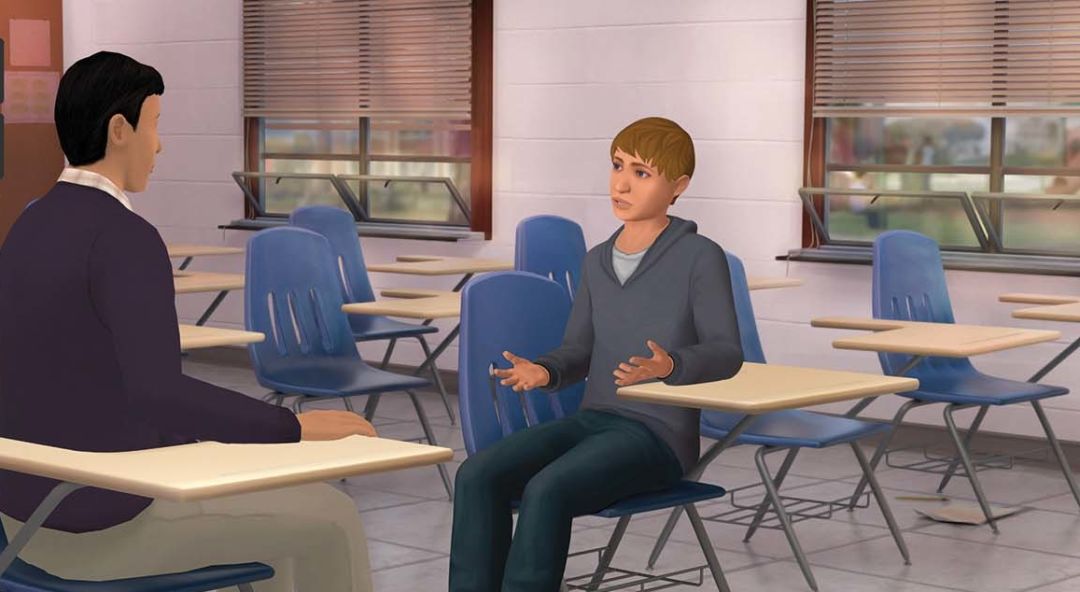Simulated Teenagers Are Training Sarasota County School Staff to Help Troubled Students

Image: Shutterstock
Rene Desmond might seem like she has it all figured out. A 17-year-old high school senior, she has excellent grades and a handful of close friends. She’s a member of the track team, the yearbook staff and National Honor Society, and she plays in the school band. But warning signs are flashing. When she received a B- on a recent test, she flipped out, and she has been texting her yearbook adviser late at night and on the weekends. One of Desmond’s friends, Tasha, thinks she might be cutting herself on her arms and legs.
How should a teacher or school staff member intervene? What’s the best way to encourage Desmond to speak with a counselor without scaring her off? Those are questions that Kognito, the interactive software system in which Desmond is a fictional character, is designed to answer. Kognito, which has been used by the Sarasota County school district since last summer, provides simulated role-playing scenarios that walk users through difficult conversations with made-up students like Desmond.

CGI role-playing from Kognito.
Image: Courtesy Photo
In a demo version of Kognito, I play Sean Lyons, a high school English teacher who’s trying to better connect with students I’m concerned about. I’m wearing khakis and a purple sweater over a plaid shirt and I’m sitting sideways at my desk, a poster of Shakespeare over my shoulder. When I meet with Desmond after school and before track practice, she’s dressed in a pink sweater and jeans. Her foot anxiously taps as I speak with her and she fidgets when I ask uncomfortable questions. The graphics aren’t the flawless CGI of blockbuster movies, but they’re advanced enough that the simulation doesn’t look cartoonish, either. When I click “Talk,” I can choose from a variety of approaches. From there, the conversation branches off, depending on Desmond’s responses and my own.
Debra Giacolone, the director of student services for the Sarasota school district, says the goal is to have every last employee, from custodians and crossing guards to principals and School Board members, complete the training. “Anybody who gets a paycheck is participating in it,” Giacolone says. “Our bus drivers sometimes are the very first person and the very last person our kids see.” At least 94 percent of the district’s 5,700 staff members have already completed the training, which can be tailored for elementary, middle and high schools.
The new training is a response to a spreading mental health crisis among young Americans. According to the Centers for Disease Control and Prevention, the suicide rate for kids ages 10-14 nearly tripled between 2007 and 2017. In 2017 alone, 3,008 kids ages 10-19 died by suicide, making it the second leading cause of death for Americans in that age range, trailing only accidents like car crashes and drowning. According to the American Psychological Association, child abuse and neglect, bullying, confusion over one’s sexual orientation, alcohol and substance abuse and access to firearms and pills are all risk factors for youth suicide. Between 2014 and 2018 in Sarasota County, 11 children between the ages of 10 and 19 died by suicide.
The goal isn’t for every school staffer to become an expert in mental health. Kognito instead teaches employees how to identify worrisome behavior and how to approach students in a nonthreatening way, with the goal of referring them to professional counselors. It’s part of a philosophy of teaching what Giacolone calls “mental health first aid.” In the same way that employees might be trained in how to apply pressure to a bleeding wound until a child can get to a nurse or doctor, they can also be taught how to effectively deal with a pressing mental health crisis until a counselor can intervene.
The Kognito training is more difficult and nuanced than you might imagine. I’m encouraged to ask open-ended questions to get Desmond to open up, but when I ask too many questions, she lurches backward and becomes defensive, as if I’m interrogating her. I want to address the harm she’s inflicting on herself, but when I bring up the topic of cutting, she crosses her arms, furious that her friend has confided in me. And when I prematurely suggest speaking to a counselor, she shuts down. Pop-ups provide tips throughout the training, and an “Undo” button lets me go back and try again. The conversation isn’t real, but I’m invested in helping Desmond.
Giacolone says that feedback from teachers and employees has been strong. “It’s not like one of those things you click through and fall asleep,” she says. “It’s a phenomenal experience.”
And if it helps even one kid?
Worth it.



